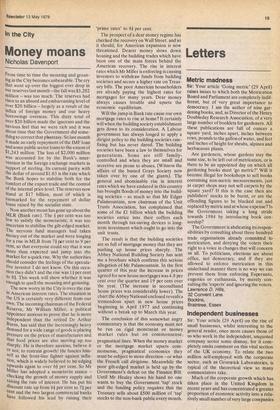Independent businesses
Sir: Your article (29 April) on the rise of small businesses, whilst interesting to the general reader, once more causes those of us who work in the independent, unquoted company sector some dismay, for it completely omits comment on this vital section of the UK economy. To relate the two million self-employed with the corporate sector, such as Grunwick Laboratories, is typical of the theoretical view so many commentators take.
Much of the corporate growth which has taken place in the United Kingdom in recent years and has concentrated a greater proportion of economic activity into a relatively small number of very large companies
has taken place without the development of adequately structured management and the training of such management in the leadership necessary to run large enterprises. One of the results has been a general lack of effective two-way communication between management of large organisations and the shop floor and the lack of motivation of the work people by management.
On the one hand we hear of abysmal productivity, gross overmanning and managers without the courage to speak out about shop floor restraints on productivity for fear of jeopardising their continuing relations with unions. On the other hand we are told that work people are primarily concerned with job security, and hence group solidarity, and not the hope or promise of increased income — increased productivity is equated with redundancy.
This lack of understanding of motives and objectives in big business with the creation of `us' and 'them' attitudes inevitably poisons the general industrial environment in which all enterprises must operate. The country needs a mood of self-confidence and optimism in itself, its work places and its products. There is little doubt that people will respond to positive and understanding leadership. There is nothing wrong with the calibre of our people, their creativeness and invention, and the basic techniques of our industry. It is attitudes that must change. We have the resources of people and productive capacity and the secure market of the EEC. North Sea oil has given us the means to respond. Government policies must ensure that we do respond and the resources are put to work.
With respect, it is those independent companies in the manufacturing and service industries, which employ sometimes as many as a thousand people, on whom the future employment progiects will depend. We are the UK's hidden arsenal. We are told that certain trade union leaders have an understanding of our case, which up until now has gone by default or become obscured by the bureaucracy of the giant organisations on the one hand and the enthusiasm of the self-employed on the other.
W.G. Poeton Chaimlan of the Union of Independent Companies, 3 Lincoln Street, London SW3



































 Previous page
Previous page